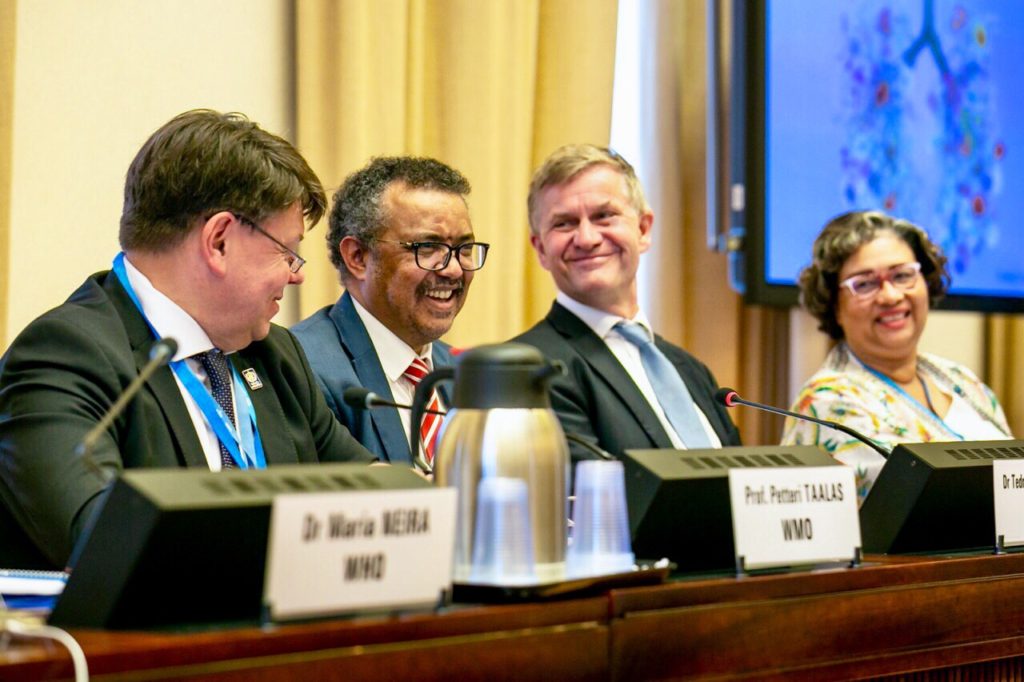A global coalition on health, environment and climate change has launched an action plan to tackle environmental threats to health, including air pollution and climate change.
The heads of the World Health Organization (WHO), UN Environment and World Meteorological Organization (WMO) launched the plan, supported by the Climate and Clean Air Coalition (CCAC), at a technical briefing for delegates on the penultimate day of the 71st World Health Assembly in Geneva, Switzerland.
Ministers of Health have put the health effects of environmental threats high on the agenda of the WHA, the annual meeting of WHO’s 192 member states.
One of the plan’s overarching goals is to reduce the annual 12.6 million deaths caused by environmental risks, and especially air pollution.
WHO Director-General Tedros Adhanom Ghebreyesus, UN Environment Executive Director Erik Solheim and WMO Secretary-General Petteri Taalas briefed delegates at the annual World Health Assembly on the priorities, opportunities and challenges in the months and years ahead.

The heads of the World Meteorological Organization, the World Health Organization and UN Environment brief delegates on the health impacts air pollution and climate change.
“If we ever want to achieve Health For All, we will need to keep health costs down, and that means three things: prevention, prevention, prevention,” Dr Tedros said.
He continued: “we must ensure people can breathe clean air, drink safe water, live in healthy conditions and eat nutritious food free from contamination.”
According to WHO figures, an estimated 7 million people die prematurely every year from air pollution related diseases, including strokes and heart disease, respiratory illness and cancer. Air pollution in most major cities exceeds WHO air quality guidelines.
“The same pollutants that are driving global warming also cause a massive current health burden from air pollution; if we are able to get the short-lived climate pollutants out of the air, we would save over 2 million lives every year and cut global warming by about 0.5 degrees Celsius,” said WHO’s Director, Public Health, Environmental and Social Determinants of Health, Dr Maria Neira, who moderated the event.
WMO chief Taalas highlighted the need to tackle short-lived pollutants but said the top challenge was in cutting emissions of carbon dioxide, the main gas driving climate change. This remains in the atmosphere and oceans for many thousands of years.
Global average concentrations of CO2 in 2017 exceeded 400 ppm, a level not seen on Earth in three million years, and average temperatures were 1.1°Celsius above pre-industrial levels. Climate change is adversely affecting economies in developing countries, and the cost of natural disasters, in particular tropical cyclones, hit a new record last year, said Mr Taalas.
He urged greater urgency in implementing the Paris Agreement on climate change to keep the temperature increase to under 2°C by the end of this century.
“Realistically we are talking about 2-4°C. If we use all of the fossil fuel resources we will reach 8°C,” he said.
Mr Taalas said the world has a “30 year window of opportunity” to reduce the carbon footprint, reign in greenhouse gas emissions and to switch to clean and renewable energy in pursuit of the “win-win solution” of tackling both climate change and pollution.
The urgency of combating pollution in countries like China has given new impetus to the drive to cut greenhouse gas emissions and tackle long term climate change, said Mr Solheim.
“If we speed up on renewable energy solutions, fewer people will die from air pollution. Let’s create a pollution free environment,” he said.
The three agencies already cooperate closely, but the new action plan spells out specific roles for the agencies involved in the coalition, which was formed at the request of signatory countries to the UN climate change convention at COP22 in Marrakech in 2016.
Read more: New coalition on health, environment and climate change is launched